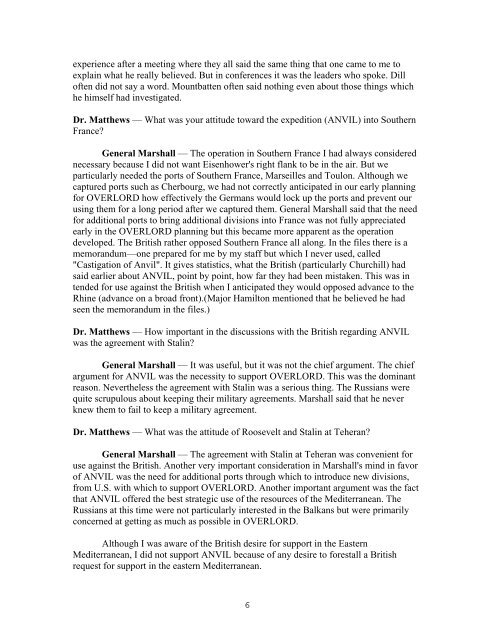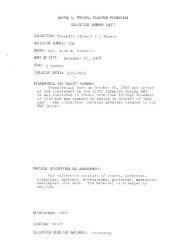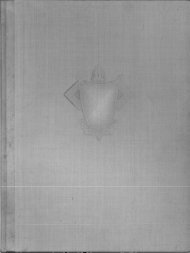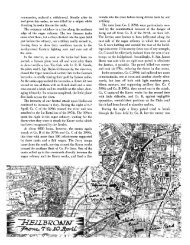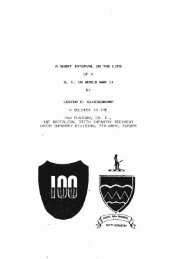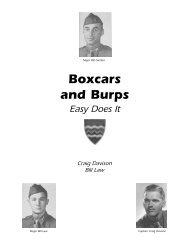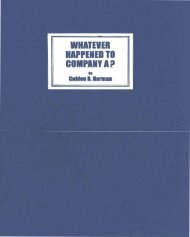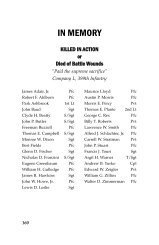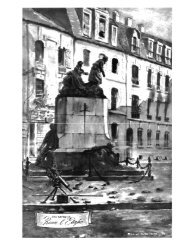July 25, 1949 - The George C. Marshall Foundation
July 25, 1949 - The George C. Marshall Foundation
July 25, 1949 - The George C. Marshall Foundation
You also want an ePaper? Increase the reach of your titles
YUMPU automatically turns print PDFs into web optimized ePapers that Google loves.
experience after a meeting where they all said the same thing that one came to me to<br />
explain what he really believed. But in conferences it was the leaders who spoke. Dill<br />
often did not say a word. Mountbatten often said nothing even about those things which<br />
he himself had investigated.<br />
Dr. Matthews — What was your attitude toward the expedition (ANVIL) into Southern<br />
France?<br />
General <strong>Marshall</strong> — <strong>The</strong> operation in Southern France I had always considered<br />
necessary because I did not want Eisenhower's right flank to be in the air. But we<br />
particularly needed the ports of Southern France, Marseilles and Toulon. Although we<br />
captured ports such as Cherbourg, we had not correctly anticipated in our early planning<br />
for OVERLORD how effectively the Germans would lock up the ports and prevent our<br />
using them for a long period after we captured them. General <strong>Marshall</strong> said that the need<br />
for additional ports to bring additional divisions into France was not fully appreciated<br />
early in the OVERLORD planning but this became more apparent as the operation<br />
developed. <strong>The</strong> British rather opposed Southern France all along. In the files there is a<br />
memorandum—one prepared for me by my staff but which I never used, called<br />
"Castigation of Anvil". It gives statistics, what the British (particularly Churchill) had<br />
said earlier about ANVIL, point by point, how far they had been mistaken. This was in<br />
tended for use against the British when I anticipated they would opposed advance to the<br />
Rhine (advance on a broad front).(Major Hamilton mentioned that he believed he had<br />
seen the memorandum in the files.)<br />
Dr. Matthews — How important in the discussions with the British regarding ANVIL<br />
was the agreement with Stalin?<br />
General <strong>Marshall</strong> — It was useful, but it was not the chief argument. <strong>The</strong> chief<br />
argument for ANVIL was the necessity to support OVERLORD. This was the dominant<br />
reason. Nevertheless the agreement with Stalin was a serious thing. <strong>The</strong> Russians were<br />
quite scrupulous about keeping their military agreements. <strong>Marshall</strong> said that he never<br />
knew them to fail to keep a military agreement.<br />
Dr. Matthews — What was the attitude of Roosevelt and Stalin at Teheran?<br />
General <strong>Marshall</strong> — <strong>The</strong> agreement with Stalin at Teheran was convenient for<br />
use against the British. Another very important consideration in <strong>Marshall</strong>'s mind in favor<br />
of ANVIL was the need for additional ports through which to introduce new divisions,<br />
from U.S. with which to support OVERLORD. Another important argument was the fact<br />
that ANVIL offered the best strategic use of the resources of the Mediterranean. <strong>The</strong><br />
Russians at this time were not particularly interested in the Balkans but were primarily<br />
concerned at getting as much as possible in OVERLORD.<br />
Although I was aware of the British desire for support in the Eastern<br />
Mediterranean, I did not support ANVIL because of any desire to forestall a British<br />
request for support in the eastern Mediterranean.<br />
6


